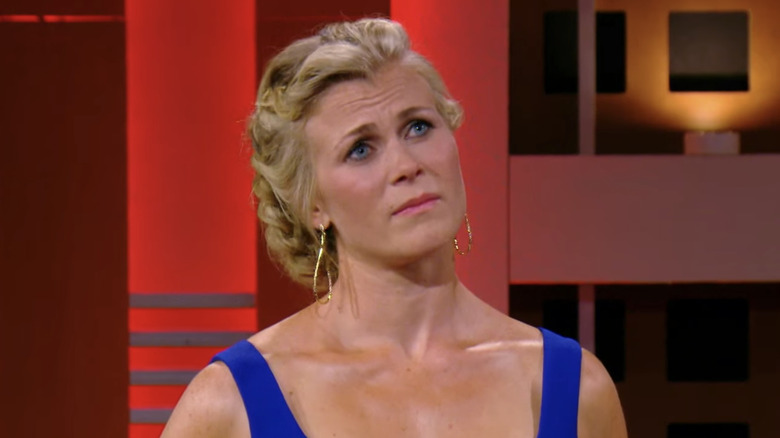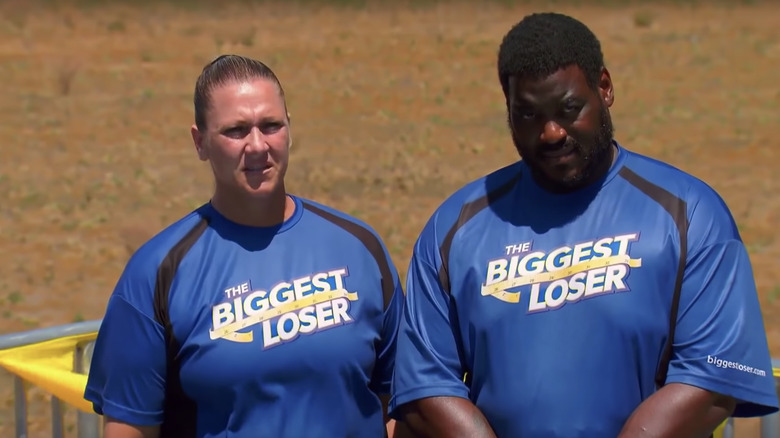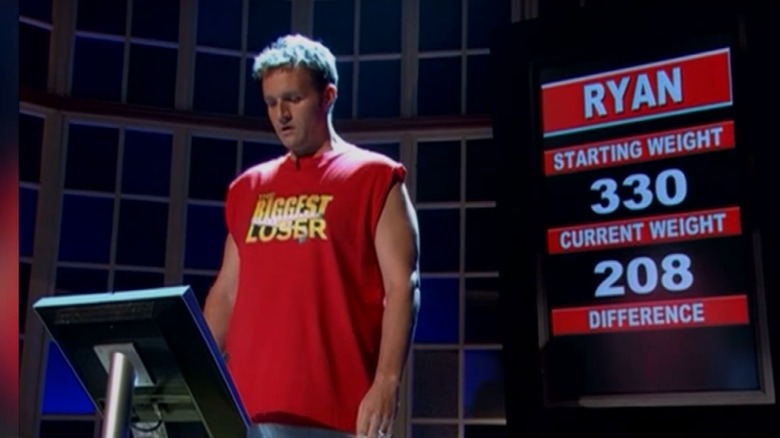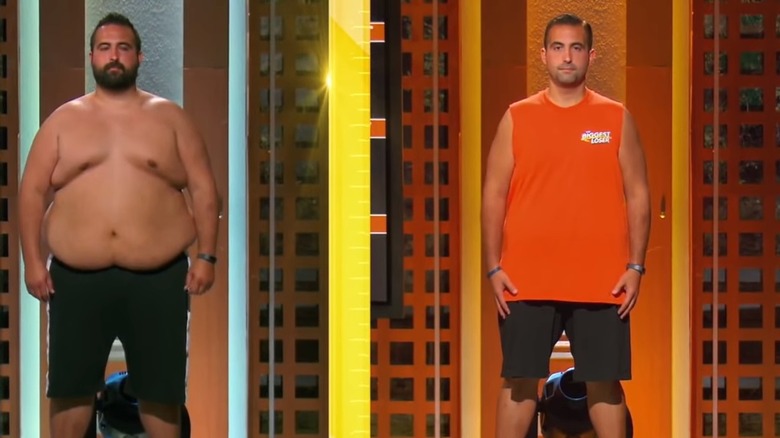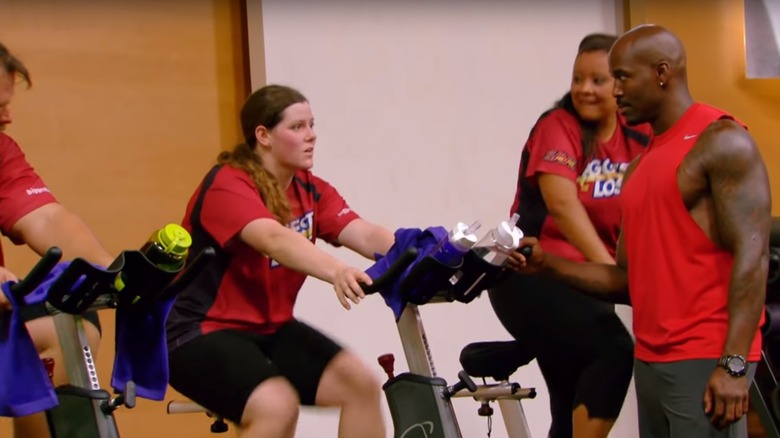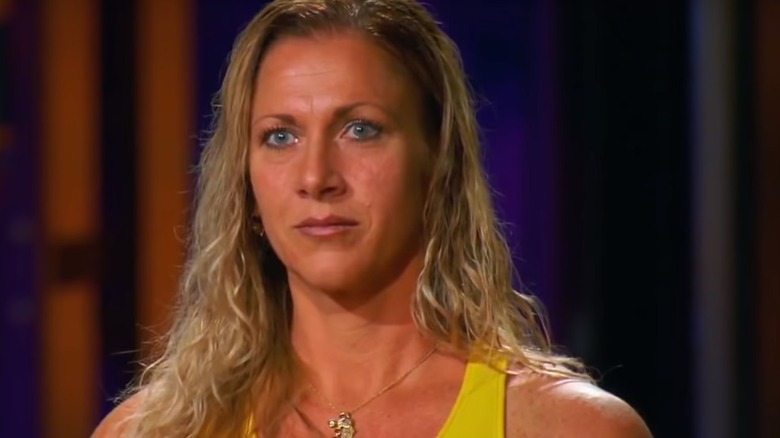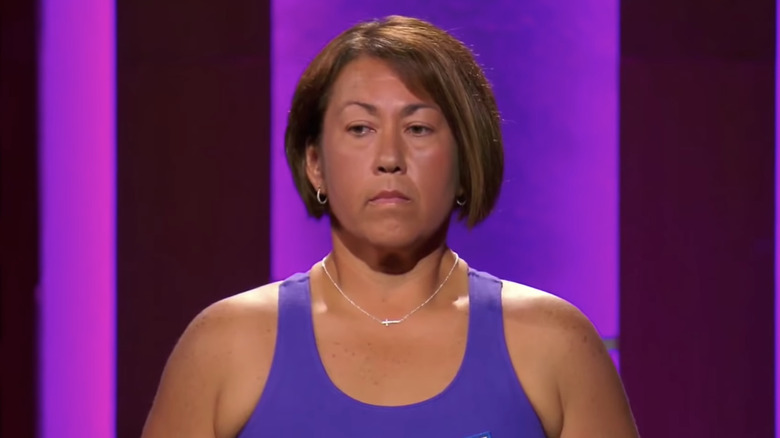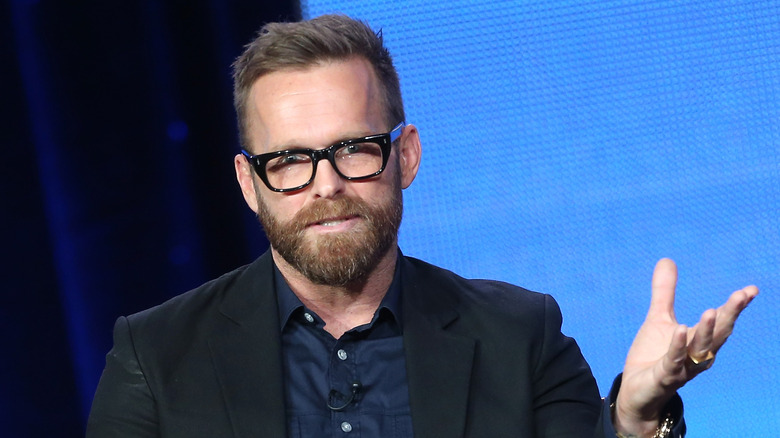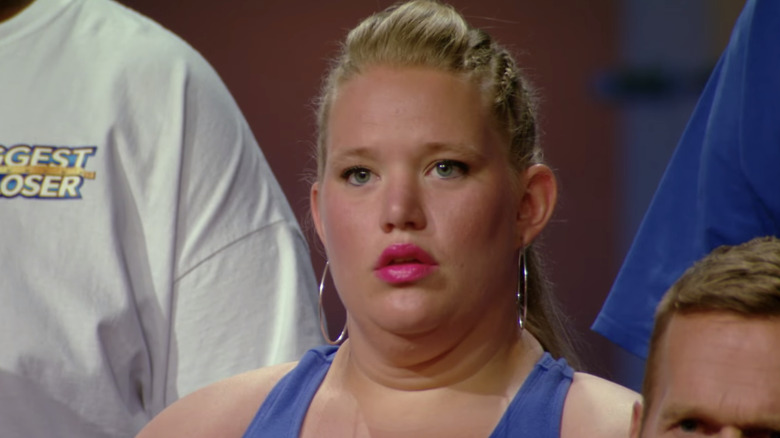The Biggest Loser: The Truth About Why Its Stars Regain Their Weight
The Biggest Loser was once a reality television juggernaut. Debuting in 2004, the show pitted a number of overweight or obese people against each other to see who could lose the most weight. The winner — or, rather, the biggest loser — walked away with a $250,000 cash prize and a lucrative title that brought them speaking events and national fame. Additionally, they got to walk off the show sporting a brand-new bod and proof that they have some seriously hardcore will power.
However, as the years rolled by, something strange began to happen: nearly all of the contestants on the show regained some — if not all — of their weight, with some even gaining more than they'd initially weighed. Then, in 2016, the National Institutes of Health released a study that scientifically corroborated what was already happening. Since then, the show has been off the air.
So, what was it that the study found? Were the show's winners still sticking to their diet and exercise routine, or did they fall off the wagon? Read on to learn why The Biggest Loser's winners regained their weight.
First, how did the stars lose it?
Fans of The Biggest Loser know that deciding to appear on the show is a brave move and not something to go into lightly. That's because the weight loss routine that contestants adhered to was seriously intense. Once they got to the ranch, the exercise began right away for up to eight hours a day, according to contestant Kai Hibbard. "There was no easing into it," she revealed in an interview with the New York Post. "My feet were bleeding through my shoes for the first three weeks." Um, yikes!
Additionally, another contestant told the paper that, on her first day, she was put through a routine that went as follows: rowing, performing body-weight work, using kettle bells, doing a cool-down on a treadmill, interval training, exercising on a StairMaster, and working outside with tires — a workout so intense she collapsed. "I thought I was going to die," she confessed. "I couldn't take any more." She was over 300 pounds at the time, so you can only imagine how hard that had to be.
As for diet, contestants ate less than 1,000 calories per day, with foods provided by sponsors, according to Hibbard. That all sounds... exhausting.
Maintaining weight loss is difficult for anyone
If you're one of the many millions of Americans who diet, chances are you know that, for most people, it's not easy to restrict what you eat. Opting to reach for the salad instead of the French fries can be a bit of a downer, and saying no to the office doughnuts can sometimes feel like a feat of strength. But if you get the results you want by making those small sacrifices, it can be quite rewarding and worth passing on the pastries.
But just as it can be tough to stick to a healthy diet, it can also be hard to maintain the weight loss, according to a paper in the American Journal of Clinical Nutrition. In it, researchers concluded that approximately 20 percent of overweight people who lost weight kept it off in the long-term, with success being defined as losing at least 10 percent of their body weight and maintaining that loss for a minimum of one year. And while they stress that that's an improvement over what people believed before, that's still not a lot.
Old habits die hard
It's not surprising that so many participants on The Biggest Loser lost a ton of weight, even in the short span of five months. Their hardcore exercise regimen combined with their restricted diet made it extremely hard not to, frankly, compounded by having some seriously intense trainers constantly telling them to keep going!
But after the show finished, contestants returned to their normal lives and their families. And while they may stroll through the door boasting a newly chiseled body, the old temptations are still there waiting for them, just as they were for Biggest Loser OG Ryan Benson. "It was real easy to slip back into old habits," he admitted in an interview with Business Insider. "The cameras aren't on 24/7 so no one's going to see you pick up four donuts on the way to work."
Benson, who'd shed 122 pounds, rewarded himself with a burger and fries on the first day that he got home. "That was one of the things that propelled me to the finish line," he continued. "I thought, when I'm done I'm going to get this. It was a reward." He has since regained all of his weight.
It's a hard exercise regimen to maintain
Unless you're independently wealthy or are lucky enough to have billionaire parents, chances are you need to work in order to pay the bills and buy what you need. And unless your job is a professional athlete, chances are you don't have the time to work out as much as the contestants did on The Biggest Loser. That is, unless you don't sleep, and that doesn't exactly sound healthy either.
Danny Cahill, the winner of the show's eighth season, actually quit his job as a land surveyor in order to maintain the exercise regimen that he adhered to after he was sent home from the ranch, according to The New York Times. He started his day with 45 minutes on the treadmill, followed by another 45 minutes after breakfast. After a 40-minute rest, he would hop on his bike and travel nine miles to the gym, where he exercised for two and a half hours. After lunch and another brief rest, he would drive to the gym for a second workout. Sometimes he would go back for a third workout after dinner, and run at night if need be. That's a full-time job!
The diet is overly restrictive to begin with
The average woman needs about 1,600 to 2,400 calories per day in order to have a healthy diet, while men need about 2,000 to 3,000 calories a day, according to the USDA. Of course, if you are trying to lose weight, you need to restrict that amount in order to run a deficit. That's why when people go on a diet, they try to eat less than what their body burns naturally, in hopes that they will shed excess pounds.
But the diets that contestants on The Biggest Loser followed cut back far more calories than most standard diets. Consider, for example, the diet that Cahill followed after he cinched the Season 8 victory crown. For breakfast, he would have one piece of sprouted grain toast, half of a grapefruit, one egg, and two egg whites, according to The New York Times. For lunch, he would usually have one grilled, boneless and skinless chicken breast, ten spears of asparagus, and one cup of broccoli. Dinner would likely be something similar, following the low-carb, low-fat, high-protein model of breakfast and lunch. Remember, he was exercising all day, too, so he had to be starving!
Contestants have to exercise even more when they return home
Apparently even doctors watch reality television — at least, Dr. Kevin Hall does, a scientist at a federal research center, according to The New York Times. He was part of a team of scientists that studied the Season 8 winners of The Biggest Loser, testing them to see how the show had impacted their bodies. Certainly there would be a lot to learn from such a unique group of people, given how quickly they lost weight.
When the researchers released the results in 2017, they divided the findings into two groups: the maintainers, who managed to keep a significant amount of weight off, and the regainers, who did not. And what they found is that the maintainers had increased their physical activity levels by a staggering 160 percent over what they did before participating on the show. On the other hand, the regainers only increased their physical activity level by 34 percent over their pre-show exercise regimens.
The researchers couldn't find any significant difference in diets, showing that getting more exercise was the key to keeping more weight off. That's a lot of cardio!
The contestants' thyroid function slowed
A 2016 study by the National Institutes of Health uncovered something a little sinister — maybe even a little unfair. For one, after testing the thyroid levels of contestants, the researchers discovered that they had dropped significantly, according to Harvard University. And since the thyroid governs metabolic function, that means their metabolisms had slowed down after participating in the show. In other words, they had to eat significantly less than they did before the show in order to maintain a healthy weight. Talk about a raw deal!
But that was something Danny Cahill knew already, even if he didn't yet have the scientific proof in front of him. "All my friends were drinking beer and not gaining massive amounts of weight," he explained in an interview with The New York Times. "The moment I started drinking beer, there goes another 20 pounds. I said, 'This is not right. Something is wrong with my body.'" Can you imagine how frustrating that must have been, especially after all of that hard work?
Leptin levels? They plummeted
In addition to uncovering info about drastically reduced thyroid levels, the 2016 study uncovered an additional change in the bodies of Season 8 participants of The Biggest Loser — one that would make it even harder for the participants to keep the weight off than your average Jane. It's starting to sound like the contestants' bodies are working against them, isn't it?
Specifically, the leptin levels of the participants had literally "plummeted," according to Harvard University. FYI, leptin, aka the satiety hormone, is a hormone secreted by fat cells that communicates directly with the hypothalamus in the brain; it sends a message that helps maintain a solid energy balance and inhibits hunger. Sounds pretty important, right?
When those leptin levels plummet, however, it triggers feelings of hunger. That means that contestants would feel hungry all of the time, given how little of the hormone is present in their systems. So now not only were they always starving, but their metabolism was significantly slower on top of that. That's just downright cruel.
Their metabolisms never recovered
According to The New York Times, researchers knew that dieting slows down a person's metabolism afterwards, no matter what size they are when they start out. So when The Biggest Loser concluded after each season, they expected the participants to deal with the same thing. That makes sense, both logically and scientifically.
But what the researchers didn't expect is that the contestants on the show would never recover their former metabolic rate, as most people eventually tend to do after going on a diet. In fact, they were downright shocked at the results. "It is frightening and amazing," Dr. Kevin Hall told the newspaper. "I am just blown away." In a nutshell, then, it's as if the participants' bodies are working against them, determined to pull them back to their original weight — forever. Can you imagine what an uphill battle that has to be?
Robert Huizenga, who was the show's doctor, said that he had hoped for a smaller drop in the contestants' metabolism, but he questioned if the results were correct.
The stars were injured on the show
One thing you won't see on The Biggest Loser is the instances when the show's contestants are seriously injured, which has happened more than once, according to an article in the New York Post. For one, Biggest Loser OG Ryan Benson was reportedly so malnourished by the time the show ended that he was urinating blood. Additionally, in 2009, two participants were reportedly admitted to the hospital, and one of them was said to have been airlifted. Yikes!
On top of that, Kai Hibbard recalled seeing some of her fellow contestants get injured while working out. "One contestant had a torn calf muscle and bursitis in her knees," she told the paper. "The doctor told her, 'You need to rest.' She said, 'Production told me I can't rest.' At one point after that, production ordered her to run, and she said, 'I can't.'" Um, that sounds like straight-up insanity.
Another cast member said that many of the contestants have permanent knee injuries. With all of the damage done, it's got to be pretty hard to keep up with the workouts that maintaining their weights require.
Were the contestants drugged?
On top of all of the weird and difficult things that have happened to former The Biggest Loser contestants, there's still additional controversies out there. One big one is that some of the show's contestants allege that they were drugged by the show's doctor, Rob Huizenga, according to the New York Post — something that could mess up their metabolism.
Joelle Gwynn, who competed on the show in 2008, said that her trainer Bob Harper's assistant gave her pills from a paper bag and said they would help her. "I felt jittery and hyper," she recalled in the article. "I went and told the sports medicine guy. The next day, Dr. H gave us some lame explanation of why they got added to our regimen and that it was up to us to take them." Additionally, Suzanne Mendonca from Season 2 spoke of other alleged horrors. "People would take amphetamines, water pills, diuretics, and throw up in the bathroom," she shared. "I vomited every single day." As if things couldn't get any wilder, she said her trainer, Harper, was happy about that.
Huizenga is in court with the New York Post, according to The Hollywood Reporter, pursuing a defamation suit.
People naturally gain weight as they age
One of the inevitable truths of life is that we're all going to age, and with that comes certain changes, according to the Mayo Clinic. Our bones shrink in size and density, our skin becomes thinner and loses elasticity, and, of course, our cardiovascular system changes. It's something that everyone will experience, no matter how much we may not like the prospect.
Of course, another change that happens to our bodies as we age is that, even though we may continue to eat the same amount that we always have, we're more prone to gaining weight than we were at a younger age. That's because metabolism just naturally slows down, so making some cuts to portion sizes is essential to maintain a healthy body weight.
But even with those cuts, it's still harder to lose weight as we age, according to U.S. News & World Report. So that's just one more thing that contestants from The Biggest Loser will have to contend with, too. Boy it would be nice if they could catch a break!
Weight loss surgery is a better option
With everything that's coming to light about the methods used on The Biggest Loser, it's arguably evident that those approaches are not ideal for long-term, sustained weight loss. That means that many obese individuals, just like the contestants on the show were, are going to be looking for new ways to shed excess weight and keep it off — for good.
Fortunately, weight loss surgery is looking like a viable option for people, as gastric bypass patients' metabolisms speed back up within a year, according to Dr. Jennifer Kraschnewski, associate professor of medicine and public health sciences at the Penn State College of Medicine. She told CNN that, while researchers are still working to figure out why, it's likely something to do with the complicated connections between the brain, the gut, and hunger-regulating hormones.
Equally important is the perspective that people have about obesity itself. "The take-home point here is that obesity really is a disease," she explained. "It's not something that you can treat once and will cure it. It's something that has to be continually addressed in one's life."
Will the show ever return?
It's unclear if The Biggest Loser will ever return to television, once again pitting contestants against one another for that coveted $250,000 prize. Although there's no end date listed on its IMDb page and although it remains to be seen if it will be formally cancelled, there are no signs that it will be back on the air at the time of this writing. It's not that there's a lack of interest for weight loss reality shows, as is evidenced by the success of TLC's My 600-lb Life, but perhaps the details that have surfaced about the show's long-term results have sullied its reputation.
Former executive producer of The Biggest Loser JD Roth did throw his resources behind another show, a six-episode series called The Big Fat Truth, which aired on the Z Living network in 2017, according to Forks Over Knives. The show, which featured former contestants from The Biggest Loser, among others, stressed the importance of a whole-food, plant-based diet for a healthy weight.
